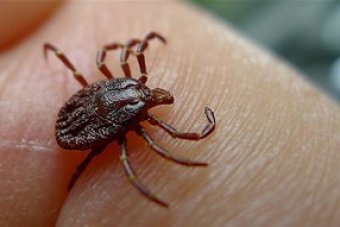Bacteria found in Australian ticks can cause similar symptoms to Lyme disease, but research is no closer to proving tick bites cause the controversial illness domestically, a researcher says.
Perth-based Murdoch University Professor Peter Irwin is heading up a national research team that has collected up to 20,000 ticks from across the country to study the bacteria they carry and their potential to cause disease.
Tick bites are a major health concern internationally and have been proven to trigger Lyme disease in some people, however the Australian breed is not thought to carry the inflammatory bacteria.
Lyme Disease is not recognised by the Australian Government, however many people have reported symptoms over the years.
Symptoms include fatigue, fever and headache. When left untreated, infection can spread to joints, the heart and the central nervous system.
The American Centre for Disease Control (CDC) says Lyme disease is caused by bacterium borrelia burgdorferi.
However controversy surrounds the long-term treatment for people who say they are chronic sufferers.
The CDC disputes claims by the International Lyme and Associated Diseases Society that long-term treatment with antibiotics is effective.
Professor Irwin said his research to date had not been able to show conclusively that Australian ticks carry the Lyme disease-causing bacteria, but has found organisms in one tick that could trigger a similar illness.
“Borrelia is the name of the bacteria that causes Lyme disease, but there are several different types,” he said.
“One of the types [of borrelia] is associated with a disease known as relapsing fever and we found the DNA bacteria of that type in one tick.”
“As the same suggests, relapsing fever causes fevers that come and go and a wide range of other symptoms in people, some of which have similarities with Lyme disease, such as extreme fatigue and nausea.”
Professor Irwin said the study was in its early days, with only 196 ticks having been examined so far.
“We need to test many more ticks yet to be certain of these results,” he said.
“We’re going to be hard at work for another year or so to try and get a representative sample of ticks from all over the country.
“The ticks here in Australia have evolved with our native wildlife and just like our wildlife is very different to anywhere else in the world, the same is true with our ticks.”
The study is being conducted by researchers from both Murdoch and Curtin universities as well as the University of Sydney.

